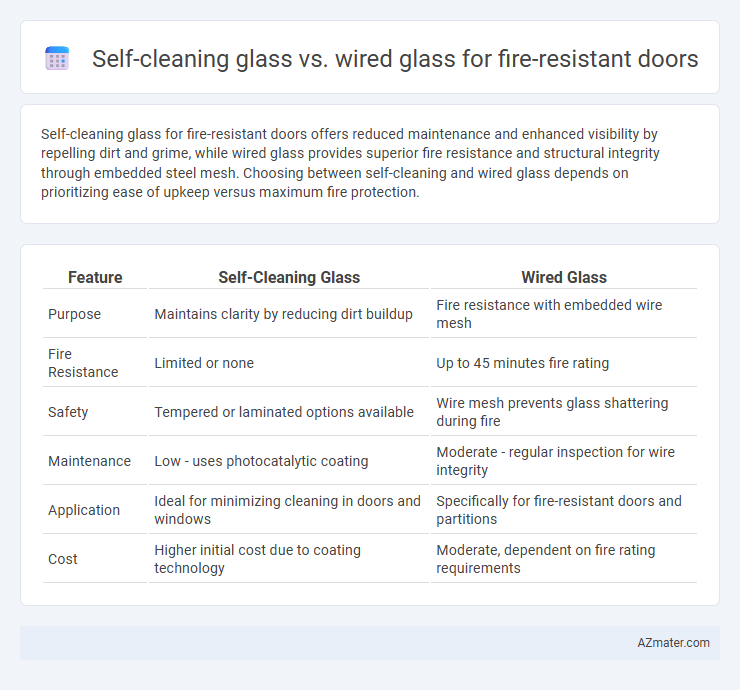Self-cleaning glass for fire-resistant doors offers reduced maintenance and enhanced visibility by repelling dirt and grime, while wired glass provides superior fire resistance and structural integrity through embedded steel mesh. Choosing between self-cleaning and wired glass depends on prioritizing ease of upkeep versus maximum fire protection.
Table of Comparison
| Feature | Self-Cleaning Glass | Wired Glass |
|---|---|---|
| Purpose | Maintains clarity by reducing dirt buildup | Fire resistance with embedded wire mesh |
| Fire Resistance | Limited or none | Up to 45 minutes fire rating |
| Safety | Tempered or laminated options available | Wire mesh prevents glass shattering during fire |
| Maintenance | Low - uses photocatalytic coating | Moderate - regular inspection for wire integrity |
| Application | Ideal for minimizing cleaning in doors and windows | Specifically for fire-resistant doors and partitions |
| Cost | Higher initial cost due to coating technology | Moderate, dependent on fire rating requirements |
Overview of Fire-Resistant Door Glazing Options
Fire-resistant door glazing options include self-cleaning glass and wired glass, each offering distinct advantages in safety and maintenance. Self-cleaning glass enhances visibility and reduces cleaning frequency with its photocatalytic and hydrophilic coatings, making it ideal for areas requiring clear views and low upkeep. Wired glass, embedded with metal mesh, provides robust fire resistance by preventing glass breakage under high heat, commonly used where maximum fire containment is critical.
What is Self-Cleaning Glass?
Self-cleaning glass is coated with a transparent, photocatalytic layer that breaks down organic dirt when exposed to sunlight, making maintenance easier and improving visibility in fire-resistant doors. Unlike wired glass, which contains embedded wire mesh for fire integrity and shatter resistance, self-cleaning glass focuses on reducing cleaning frequency and enhancing aesthetic appeal. This advanced technology is ideal for fire-rated doors in commercial buildings where clarity and cleanliness are essential for safety and functionality.
What is Wired Glass?
Wired glass is a type of fire-resistant glass embedded with a mesh of thin metal wires that help hold the glass together during a fire, preventing shattering and maintaining a barrier against flames and smoke. It is commonly used in fire-resistant doors and windows to enhance safety while allowing visibility. Unlike self-cleaning glass, which focuses on reducing maintenance by breaking down dirt with a special coating, wired glass prioritizes fire protection through its reinforced structure.
Key Properties of Self-Cleaning Glass in Fire Doors
Self-cleaning glass in fire-resistant doors features a special photocatalytic coating that breaks down organic dirt when exposed to UV light, reducing maintenance and enhancing visibility during emergencies. Its hydrophilic surface allows rainwater to spread evenly, washing away residues and preventing streaks, which ensures clear vision under fire safety conditions. This glass type maintains fire resistance standards while providing long-lasting cleanliness, contrasting with wired glass that relies primarily on embedded metal mesh for fire containment but lacks self-cleaning benefits.
Fire Resistance Performance: Self-Cleaning vs Wired Glass
Self-cleaning glass for fire-resistant doors offers enhanced visibility and reduced maintenance but generally has lower fire resistance ratings compared to wired glass, which provides superior structural integrity under fire conditions. Wired glass contains embedded mesh that prevents glass breakage and maintains barrier effectiveness during high heat exposure, typically achieving up to 90 minutes of fire resistance. In fire-rated applications, wired glass ensures compliance with strict safety standards, while self-cleaning glass is better suited for environments prioritizing cleanliness over maximum fire protection.
Safety and Security Considerations
Self-cleaning glass enhances visibility and reduces maintenance, supporting fire-resistant doors without compromising safety during emergencies due to its robust heat resistance. Wired glass offers superior security by containing glass fragments when shattered, minimizing injury risks and maintaining barrier integrity against fire and smoke. Selecting between self-cleaning and wired glass requires evaluating factors like fire-rating certifications, impact resistance, and compliance with building safety standards for optimized protection.
Maintenance Needs: Self-Cleaning Glass vs Wired Glass
Self-cleaning glass requires minimal maintenance due to its photocatalytic and hydrophilic coatings that break down organic dirt and rinse away debris with rainwater, significantly reducing cleaning frequency. Wired glass, however, demands regular inspections and thorough cleaning to prevent grime accumulation around wire mesh, which can compromise visibility and fire resistance over time. The durability of wired glass often necessitates professional maintenance to ensure fire safety standards are consistently met.
Aesthetic and Design Impact
Self-cleaning glass for fire-resistant doors offers a sleek, modern aesthetic with smooth, unobstructed surfaces that enhance natural light and maintain a pristine appearance over time. Wired glass, by contrast, features embedded wire mesh that imparts a more industrial or traditional look, often disrupting transparency and reducing visual appeal. Designers prioritize self-cleaning glass when aiming for contemporary, minimalist designs, while wired glass suits applications requiring a rugged, utilitarian aesthetic.
Cost Comparison and Availability
Self-cleaning glass for fire-resistant doors typically carries a higher upfront cost compared to wired glass due to advanced coatings and manufacturing processes, but it reduces maintenance expenses over time. Wired glass is generally more affordable and widely available, making it a popular choice in budget-sensitive projects requiring fire resistance. Availability of self-cleaning glass may be limited to specialized suppliers, while wired glass is commonly stocked by most glazing distributors and fire door manufacturers.
Choosing the Best Option for Fire-Resistant Doors
Self-cleaning glass offers low maintenance and enhanced clarity, making it suitable for fire-resistant doors in environments requiring visibility and easy upkeep. Wired glass, embedded with metal mesh, provides superior fire resistance and containment by preventing glass shattering under high heat, meeting stringent safety codes. Selecting between self-cleaning and wired glass depends on prioritizing fire safety standards compliance versus maintenance convenience in fire-resistant door applications.

Infographic: Self-cleaning glass vs Wired glass for Fire-resistant door
 azmater.com
azmater.com